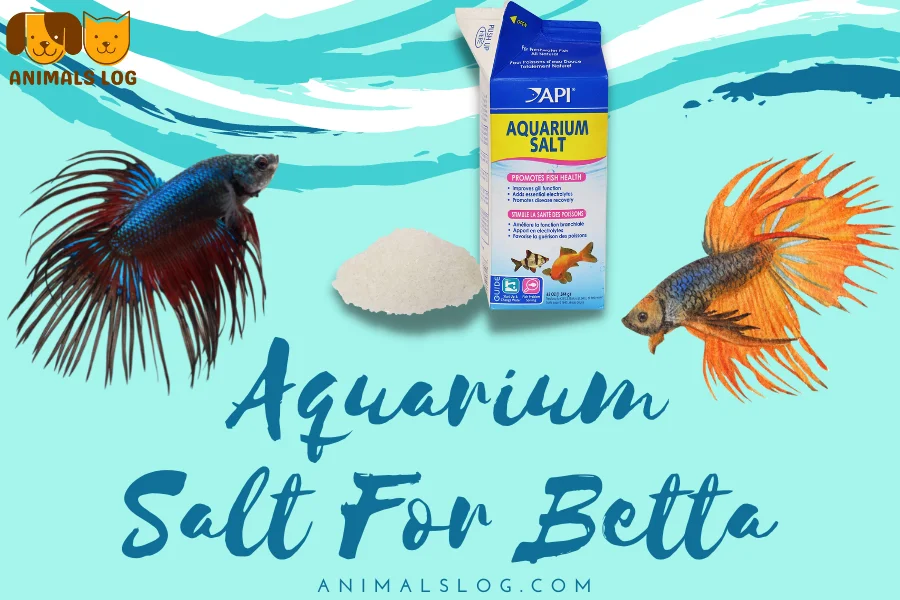Betta fish is a hostile, sensitive, and short-tempered freshwater fish. Any minute changes in any of the water or tank parameters might cause detrimental severe health issues in your betta. One must know aquarium salt for a betta, the most accepted treatment among fish enthusiasts for most betta diseases.
Aquarium salt for betta has been quite a debate for a long time in the market. Some claim that aquarium salt for a betta is nothing but healthy. It helps treat many fungal and bacterial infections and rotted fins in betta. They also believe that salt provides essential nutrients required by the betta without changing any habitual characteristics. On the other hand, some claim overdosing aquarium salt for betta can be not only harmful to betta fish but also for live plants. We have drawn a guide towards aquarium salt for a betta for this paradoxical topic.
No products found.
Aquarium Salt For Betta: What Is It?
Aquarium salt is a chemical compound of sodium and chlorine in its purest form. Since betta is a freshwater fish, it is not a part of its natural habitat. Nonetheless, it can be used by betta fish owners to treat quite a handful of diseases in their fish.
It should be noted that there is a difference between aquarium salt and regular salt. The former is the purest form of salt, aquarium salt, for it is naturally produced from evaporated seawater and hence contains no additives. On the other hand, normal salt has a handful of artificial nutrients added. Do not confuse the two to be the same.
Aquarium salt is a perfectly healthy treatment option for your betta fish. However, bear in mind it is a treatment option. Overdosing will have dreadful impacts on your tank family. Aquarium salt is excellent in treating fungal and bacterial diseases in fish, like, rotted fin, itch, velvet.
Aquarium salt is an excellent natural and safe way of providing your betta a first aid treatment for any disease. However, if the disease augments, we recommend consulting a proper professional. Overdosing of aquarium salt is dangerous, but even a slight dose of salt in the tank with either scaleless fish or live plants might be catastrophic.
For scaleless fish like pictus catfish, which is generally considered a healthy tank mate to betta fish because of its calm nature, aquarium salt can weaken and cause death. The salt desiccates the natural slime layer of the scaleless fish, disabling its natural barrier towards any bacterial or fungal disease.
Likewise, live plants are also a victim of aquarium salt. Aquarium salt for betta can disturb the salinity of water resulting in gentle plant species’ damage. Some plants like Java Moss or fern are hard and might survive slightly high salinity in water.
Aquarium Salt For Betta: When To Use?

Aquarium salt is helpful in betta fish because it boosts the functional ability of the fish in the aquarium water and can be utilized as a remedy for illnesses. There are a few instances where aquarium salt can be used for betta fish.
Parasitic fungus And Bacteria Development
It’s possible that you missed a couple of cleanup appointments or overfed the fish. A betta’s survival depends on proper filtration. Inappropriate filter and heater facilities in the tank are the reason for poor water quality in the tank, which will eventually cause bacterial infection in betta.
The aquarium is likely to be a potential source for parasites, viruses, and bacteria, all of which can pose complications for the fish, such as velvet, dropsy, and other ailments. When it comes to controlling these infestations, introducing aquarium salt for betta can help in the long run.
The Nitrate Content Is Increasing
Nitrate levels that are too high are harmful to your betta. Excessive consumption, more than required tank mates, dead plant wastes, filthy filtration, and other factors can contribute to excessive nitrate levels. Aquarium salt prevents fish from ingesting toxic nitrates.
Developing The Slime Layer
While overdosing on aquarium salt for betta could cause depletion of the slime coat in freshwater fish like betta, if added in appropriate quantities can help betta develop the slime coat and strengthen it. The slime layer acts as a shield for your betta against any external pathogens and acts as a solution to water resistance.
Oxygen deprivation and elevated toxicity concentrations, temperature fluctuations, and similar variables could trigger the deterioration of the slime layer in betta with time. Aquarium Salt, when used in the right amounts, can hasten the formation of this slime covering. The salt can also help bettas with infectious diseases and injuries.
Aquarium Salt For Betta: How To Use?

Aquarium salts are beneficial for treating infections and inflammation in freshwater fish such as betta. However, there is a method of using aquarium salt to treat these diseases. Here are a few disorders and their treatment mechanism explained in betta fish.
Fungal Infections: Treatment
- Quarantine your betta fish into a different or new tank.
- Meanwhile, clean its old tank
- Raise the temperature to 75 or 77 degrees Fahrenhite.
- Add a tablespoon of aquarium salt for betta to each gallon of water.
- Replace 80 perecnt water everyday.
- Do this for not more than 10 days. Consult a professional if symptoms still persists
Velvet: Treatment
- Quarantine your betta to another tank and eliminate carbon and other chemicals from the filter.
- Raise the temeprature up to 85 degrees Fahrenhiet.
- Add a tablespoon of aquarium salt for betta for every 2.5 gallons of the tank.
- Clean 80 perecnt of the tank everyday for at most 10 days.
- Do not let too much light to enter in the tank for the treatment duration.
Itch/ White Spots: Treatment
- Quarantine your fish.
- Raise the temperature slightly.
- Add 1/2 tablespoon aquarium salt for betta for every gallon of water.
- Add solution of methylene blue or malachite green.
Betta Popeye: Treatment
- Add five to 10 tablespoon of aquarium salt in an empty clean bucket.
- Add a gallon of water from the tank to the bucket gently.
- Make sure that teh salt is compelly dissolved so that aquarium salt for betta popeye works.
- Add your betta fihs to the saline water now for at least 30 minutes.
API Aquarium Salt:

Product Overview:
In a freshwater tank, API aquarium salt improves gill functionality and reduces anxiety, promoting the well-being of your betta. This organic salt delivers the electrolytes that betta requires for oxygen consumption and carbon dioxide and ammonium discharge via the gills.
API aquarium salt can only be used to reduce anxiety during the setting and water alterations of a new freshwater tank or aid illness treatment when dealing with certain fish medical problems. When using salt with plants, use caution because some plants are allergic. It’s simple to keep a lovely freshwater tank using API Aquarium supplies.
Customer Reviews:
Customers’ feedback has been overwhelmingly positive. API products, according to users, enable caring for your betta and tank better. API Aquarium cleaning materials can be used in association to reduce algae encourage beneficial microbial activity.
It also aids in the therapy and recovery of fish infections and ailments, including itch and fin decay. They aim to create a secure, friendly place for tropical community betta fish tanks, including other fish.
Pros And Cons:
FAQs on Aquarium Salt For Betta
Is aquarium salt for betta safe?
If added to the tank in the right quantities, aquarium salt for betta will do nothing but assist in the healing of betta infections. Do not add the salts if there is no sign of a disease.
Does aquarium salt change the pH level of water?
No. The salt components are sodium and chlorine in 1:1 proportion which is purely soluble in water. Therefore, it will not change the pH level but can alter the salinity of the water.
Can I use other salts in place of aquarium salts?
No, you cannot. They contain additives that can be harmful to your betta. Aquarium salts can only be able to provide the benefits listed above to your fish.
How much is aquarium salt per gallon for a betta safe?
The suggested amount of aquarium salt for a betta is one tablespoon for every gallon of water. Do not add directly; dilute it and then add.
Final Thoughts:
Aquarium salt for a betta is nothing but a wise choice for your tank when treating betta fish for infections. Nevertheless, it has one disadvantage that branches out many other disadvantages that are overdosing. Overdosing of aquarium salts should be avoided at all costs for a better life.







